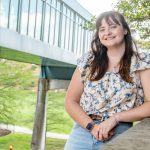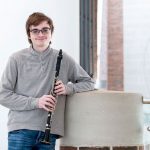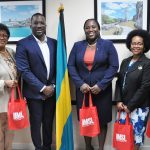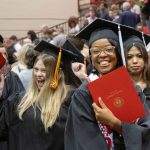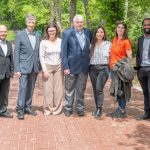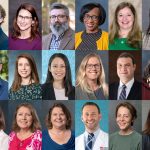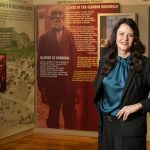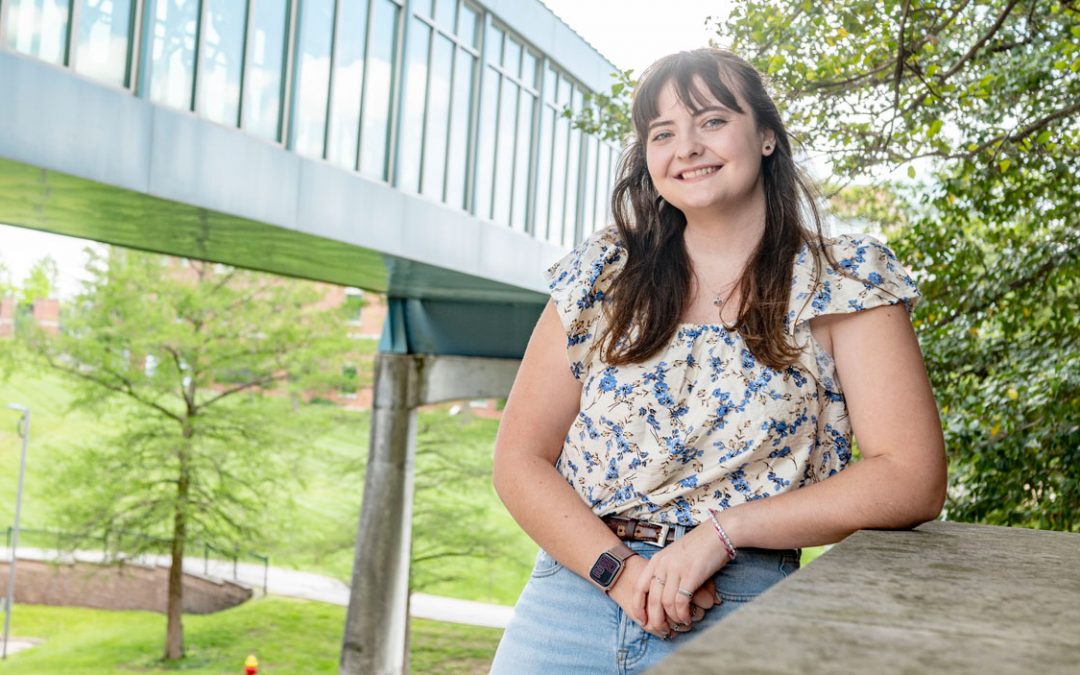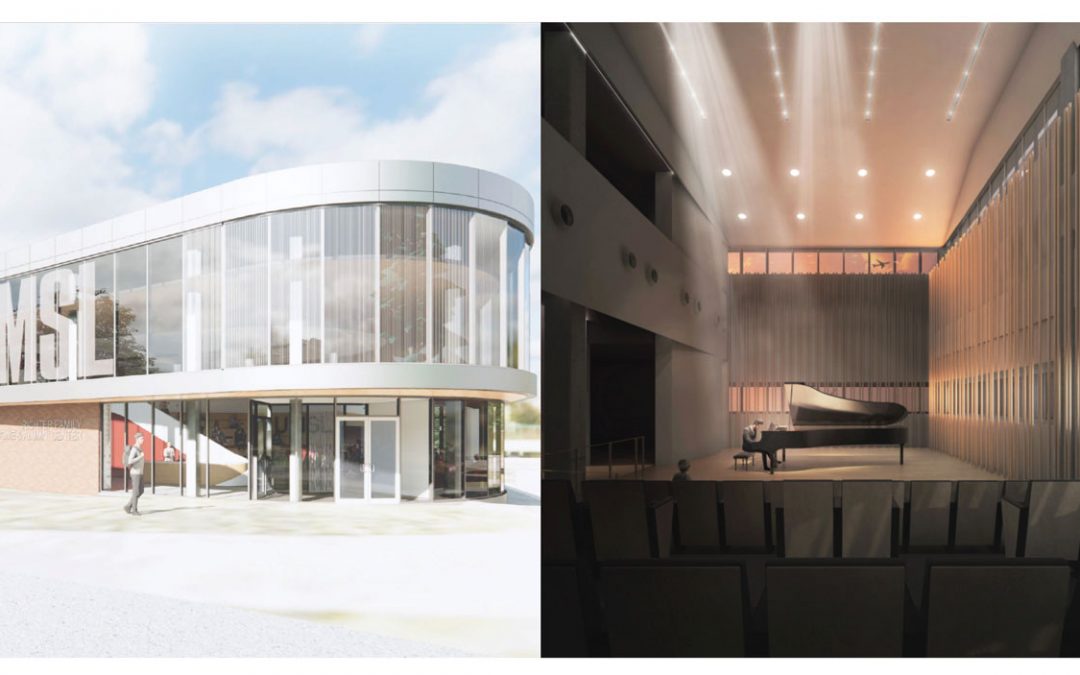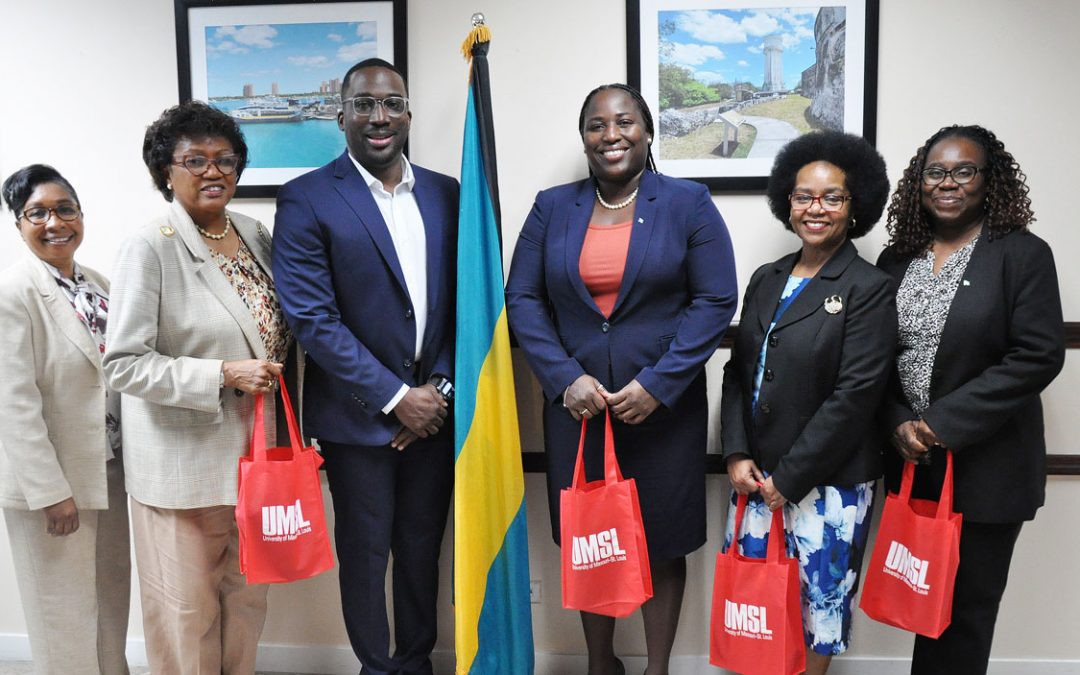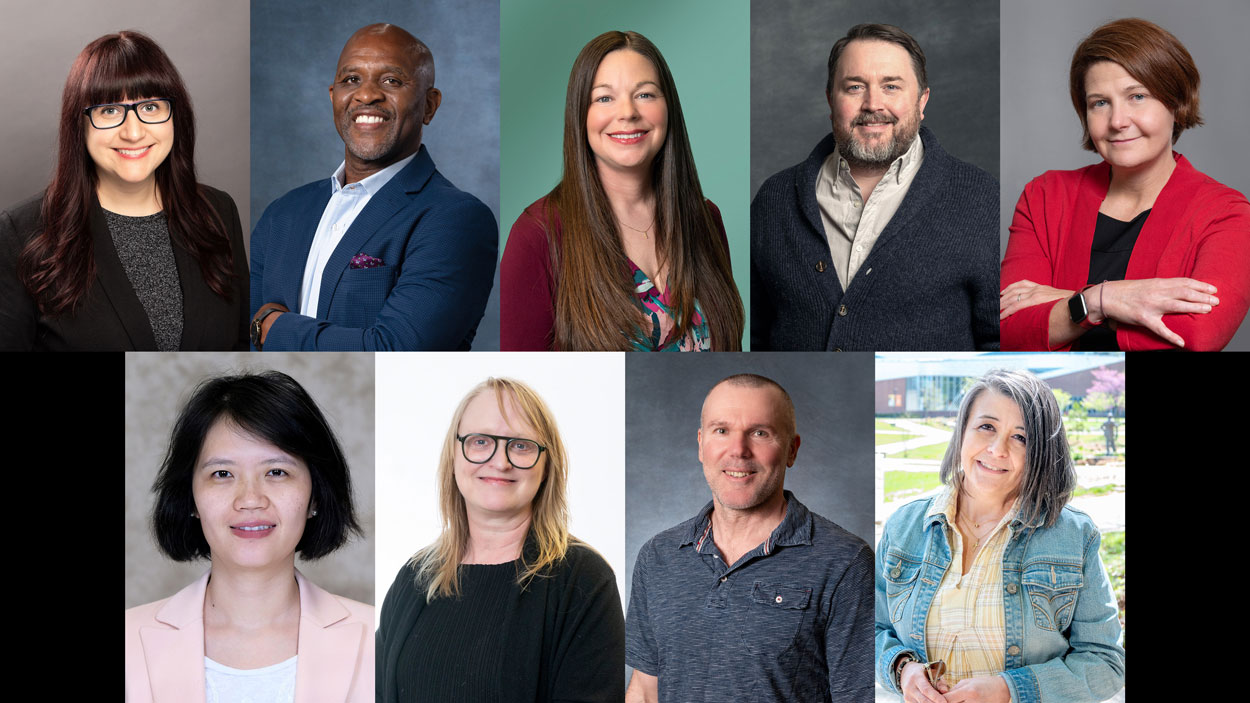
Amber Candela, Jerome Morris, Kate Watt, Lon Chubiz, Lee Slocum, Jennifer Chen, Lara Kelland, Waldemar Rohloff and Leighanne Heisel have been granted time to devote to research or course development during the fall or spring semester of the 2025-26 academic year. (Photo collage by Derik Holtmann)
The University of Missouri–St. Louis is granting sabbaticals or teaching releases to six tenure track and three nontenure track faculty members to expand their scholarship or enhance the curriculum during the upcoming academic year.
Associate Professor Amber Candela from the Department of Educator Preparation and Leadership; Associate Professor Jennifer Chen from the Department of Accounting; Associate Professor Lon Chubiz from the Department of Biology; Lara Kelland, the E. Desmond Lee Endowed Professor in Museum Studies and Community History in the Department of History; Jerome Morris, the E. Desmond Lee Endowed Professor in Urban Education; and Professor Lee Slocum from the Department of Criminology and Criminal Justice will each spend either the fall or spring semester pursuing research work through the university’s sabbatical leave program.
Nontenure track faculty members Leighanne Heisel, an associate teaching professor in the Department of Communication and Media; Waldemar Rohloff, a teaching professor from the Department of Philosophy; and Kate Watt, an associate teaching professor in the Department of English; have also received teaching releases to allow them to enhance their teaching skills or work on curriculum or course development through UMSL’s Teaching Release Program for Nontenure Track Faculty.
The program is meant to allow for professional development for experienced, non-tenure track faculty.
“Sabbaticals provide faculty members invaluable opportunities to pursue scholarly activity or explore ways to improve curriculum, and we know they can inspire innovation as well as enrich academic contributions,” said Steven J. Berberich, provost and vice chancellor for academic affairs. “We are once again pleased to be able to provide these opportunities to our exceptional faculty members at UMSL. We are eager to see what their work yields in the year ahead.”
Under University of Missouri System policies, tenured faculty members are eligible to apply for a sabbatical leave after six or more years of service. There are similar requirements for nontenure track faculty members to be eligible for UMSL’s Teaching Release Program.
The application process for sabbaticals and teaching leaves during the 2026-27 academic year will open later this year with deadlines to apply next fall.
Learn more about how each of the faculty members plans to use their time away.
Sabbaticals
Amber Candela, Department of Educator Preparation and Leadership: Candela is currently a co-PI on a National Science Foundation-funded project, “Practice Driven Professional Development.” She is working with Zandra de Araujo from Lastinger Center at the University of Florida and Sam Otten from the University of Missouri–Columbia. They have created “nudges” – or small interventions – for Algebra teachers as professional development to impact instruction. They created the nudges around ubiquitous teaching practices such as whole class discussions, independent work and homework, and they believe they can be easily taken up by teachers. They have pushed out 18 nudges with two cohorts of teachers. Additionally, they received funding this year from the Bill Gates Foundation to create instructional nudges based on the Mathematics Language Routines to support teachers’ incorporation of the MLRs in practice. Candela will be spending time on both projects in the year ahead, completing data collection on the former and working on a pilot with the latter. She and her colleagues are working to publish their findings in both research-focused and practitioner-friendly journals. They are also developing a book proposal and exploring future grant opportunities to extend the work. They hope to create targeted, accessible professional development tools, including PDFs, videos and possibly social media content to help deepen teachers’ content knowledge and enhance instructional practices across grade levels.
Jennifer Chen, Department of Accounting: Chen plans to use the fall semester to build a portfolio of research projects focused on understanding accounting disclosure, measurements and forecasting. She notes that accountants measure and summarize firms’ activities into a set of accounting numbers and complement them with footnotes according to accounting standards. One focus of accounting research is to understand how useful those statements and footnotes are to users. A challenge in accounting research is to figure out how to incorporate a large amount of qualitative and quantitative information available from the accounting reports and other information sources, but Chen believes recent developments in machine learning show promise at helping researchers process and comprehend large amounts of unstructured data. She intends to evaluate the revenue footnote disclosure required by the Accounting Standards Codification 606 using Large Language Models and incorporate textual data and machine learning methods into forecasting revenue and measuring off-balance sheet intangible assets. She hopes the sabbatical will enhance her ability to work with large textual datasets and machine learning methods by building on her prior research on disclosure, intangible assets, accounting regulation and ChatGPT.
Lon Chubiz, Department of Biology: Chubiz plans to spend his year-long sabbatical on site in Idaho, at the EMBER – Embedding Molecular Biology in Ecosystem Research – Institute. Housed at the University of Idaho and its UIdaho Experimental Forest, the institute was founded last summer with the support of a $15 million grant from the National Science Foundation’s Biology Integration Institutes program. Chubiz is part of a team of investigators working on the grant, and as a microbiologist, he is specifically studying the effects of soil bacteria on conifer forest resilience and recovery from fire and drought. The institute is kicking off its first full year of experiments this spring. Chubiz expects working on-site in Idaho will help him initiate novel experimental studies and learn field research skills transferrable to the undergraduate lab courses he teaches. He also aims to strengthen collaborations with his fellow investigators and pursue new research directions and opportunities for future funding and additional student training. Chubiz hopes his sabbatical will impact his scholarship, teaching, and service in ways that support his own professional development and that will also benefit student growth, including in the Collaborative Laboratory Internships and Mentorship Blueprint – or CLIMB – which he directs.
Lara Kelland, Department of History: Kelland plans to use her year-long sabbatical to complete and submit a full draft of her book manuscript “Collective Memory in Isla del Encanto: Island and Diaspora Heritage during the American Imperial Century,” which traces the use of heritage through colonial, official and oppositional visions of nationhood on the island of Puerto Rico and throughout the diaspora. Kelland has already completed significant work on the project, which is under contract with the University of Massachusetts Press in the same Public History in Historical Perspective Series that also includes her first book, “Clio’s Foot Soldiers: Twentieth-Century U.S. Social Movements and Collective Memory.” Kelland intends to conduct four archival research trips: to the National Archives in Washington; to the Archivo General in San Juan, Puerto Rico; to the Center for Puerto Rican Studies at Hunter College in New York; and to interview staff at the Puerto Rican Cultural Center in Humboldt Park in Chicago. The sabbatical will provide her the opportunity to conduct this remaining research as well as the time and space she needs to complete her manuscript and submit it for review.
Jerome Morris, Department of Educator Preparation and Leadership: Morris plans to use his fall semester sabbatical to finish writing a book that reframes conversations about African Americans’ educational experiences by focusing on a middle-class and predominantly African American suburb in Atlanta. He expects to revisit and become immersed in sites where he conducted research more than a decade ago. Through multiple lenses as a researcher and as a resident of the community and school district that served as a major hub for Black migrants to the American South, Morris aims to take the reader into three demographically different high schools and communities. He will embed investigations of schools, communities, families and adolescents within a study of the suburban context. His data sources include ethnographic interviews and observations with 75 Black students and their families; more than 1,300 surveys of a demographically diverse group of students’ beliefs about race, opportunity and education; approximately 100 interviews with teachers, principals, district-level administrators and community members; and school-district level and U.S. Census data. The book will provide a robust understanding of education in a major metropolitan area in the South and will offer insights into the role of education in African American people’s upward mobility.
Lee Slocum, Department of Criminology and Criminal Justice: Slocum intends to use her fall semester sabbatical to research the role public safety communications personnel – commonly called emergency or 911 dispatchers – play in the criminal justice system. The limited research done on these gatekeepers demonstrates that they make a wide range of discretionary choices, can influence how police officers approach the situations they respond to and have some power to determine which calls receive a police response, which are routed to diversionary programming and which are addressed through other means, including by the dispatchers themselves. Slocum intends to add to the scholarship on PSCP by drafting two peer-reviewed publications on the topic. The data she plans to use is currently being collected as part of a MacArthur Foundation-funded grant examining the decision-making process of PSCP in St. Louis County, East Baton Rouge Parish in Louisiana and Charleston, South Carolina. It includes administrative data on calls to the police and police dispatches as well as interviews with dispatchers and officers and social observations of dispatchers answering calls to both the 911 and non-emergency line. She is working in collaboration with colleagues at Arizona State University and plans to pursue grant funding from such agencies as the MacArthur Foundation, Arnold Ventures and the National Institute of Justice for future work.
Teaching releases
Leighanne Heisel, Department of Communication and Media: Heisel has seen the cost burden of college textbooks increase throughout her career and has made it a point to seek low-cost alternatives for her students. She plans to spend the fall semester revising and updating the Open Educational Resource textbook students have been using in her high-enrollment Communication in the Organization course over the past six years. She aims to provide content, theory and applications that she believes will be more relevant to contemporary, post-pandemic students, and she plans to research examples and case studies involving local companies. She said she will be collecting and integrating relevant statistics, updating existing statistics and adapting the language to reflect the current environment and understanding of organizational communication.
Waldemar Rohloff, Department of Philosophy: Rohloff will spend the spring semester of 2026 overhauling the Department of Philosophy’s Engineering Ethics course. He believes the opening of UMSL’s new School of Engineering and the growth of the Geospatial Collaborative make it an ideal time to undertake such a project. Rohloff plans to make improvements to the course, including updates to reflect recent changes to the codes of ethics of professional engineering organizations, considerations about the use of Artificial Intelligence technology in engineering and the inclusion of new Geographic Information Systems-specific content. He expects the revitalized course will better prepare students to incorporate public health, safety, welfare, as well as global, cultural, environmental and economic factors into their future engineering careers.
Kate Watt, Department of English: Watt serves as the faculty advisor for UMSL’s student literary publication, LitMag, which publishes a yearly collection of student poetry, fiction and visual art. The journal, which was founded on campus in 1983, has grown into a robust, award-winning,150-page full-color book distributed across campus each spring. Watt will use her teaching leave to help strengthen LitMag’s long-term sustainability. She plans to re-develop and re-sequence a senior capstone course in the Writing Certificate Program to produce the book, train and supervise a third-year teaching assistant supporting the course and develop interdisciplinary partnerships to strengthen the publication. She will also work to secure a guaranteed financial base to cover production costs. Additionally, Watt intends to participate in faculty development.


